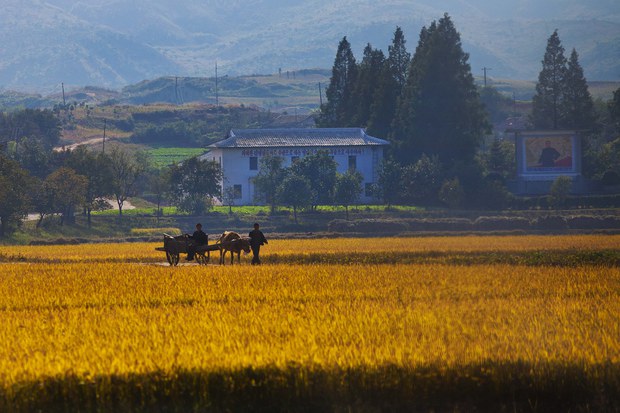North Korean farmers pressured to repay debts early
Share

North Korean farmers walk along a road through a farm field outside the eastern coastal city of Wonsan, North Korea, Oct. 8, 2011. Credit: David Guttenfelder/AP
North Korean propaganda showing plentiful harvests this year is putting pressure on farmers to repay debts they incurred during the planting season, but residents told Radio Free Asia that most of the harvest hasn’t been processed, meaning they are not yet able to pay.
At the beginning of October, authorities reported a harvest miracle complete with pictures showing rice bags piled sky high, crediting the country’s leader Kim Jong Un for ensuring that farms got what they needed to increase food production this year.
But the reality is that farmers need to borrow money from wealthy elites, called donju in Korean, during each planting season to pay for seeds and other supplies.
“These days, the work crew leaders at farms in Chungsan county are all hiding from their sponsoring donju,” a resident of South Pyongan province, north of Pyongyang, told RFA Korean on condition of anonymity for security reasons. “The donju are demanding they repay their debts.”
After the devastating 1994-1998 famine, North Korea’s impoverished government halted subsidies to collective farms, telling them to find funding themselves. Since then, farm managers have begun each planting season by taking out loans with the promise that after the harvest, they would repay in harvested crops.
The farms still had to grow enough to satisfy state quotas under this new system, but as long as the harvests were plentiful, there was enough to pay both the donju and the state.
Sources told RFA that typically the harvested crops collected by the donju must be worth double what the farm borrowed. If the amount to be repaid is one-fifth of the total harvest, this is usually not a problem.
But circumstances do not always go according to plan. RFA reported in April of last year that poor harvests in 2021 resulted in debt lingering into 2022.
Demanding repayment
Though government propaganda is designed to promote trust in North Korean leadership and loyalty to the state, by saying that harvests were plentiful, the farmers are under extreme pressure to pay up with food supplies they don’t have.
The South Pyongan resident said that normally the farmers pay the donju back at the end of November, after threshing is completed and the books are cooked to show lower farming yields so that the state can collect a smaller amount, and the donju can get their cut.
“But in October, some of the farms set up distribution sites and advertised good harvests,” the resident said. “So the donju who lent money to the farms are tracking down farm officials and demanding that they repay their debts.”
The propaganda showed that the farmers were already distributing rice, she said. But it is still threshing season and the astonished farmers have nothing to give the donju.
In Ryongchon country in the northwestern province of North Pyongan, the propaganda made the farm officials “sigh deeply,” a resident there told RFA on condition of anonymity to speak freely.
“When they say that they have begun distribution, the donju who lent money to the farms in the spring want to recoup their investment,” he said. “Usually the debts are repaid before distribution begins.
Propaganda praising a particular farm for having a high yield is bad news for donju, the resident said.
“If the farm is set up as a model farm this month for its outstanding achievements, other farms will have to exceed the grain plan to donate to the nation like the model farm,” he said. “Then there may be a shortage of grain that should be paid to donju.”
So even if the donju did not lend to an “outstanding” farm, they still must scramble before the surrounding farms allocate more to the state and leave them hanging dry, he said.
Translated by Claire Shinyoung Oh Lee. Edited by Eugene Whong and Malcolm Foster.







